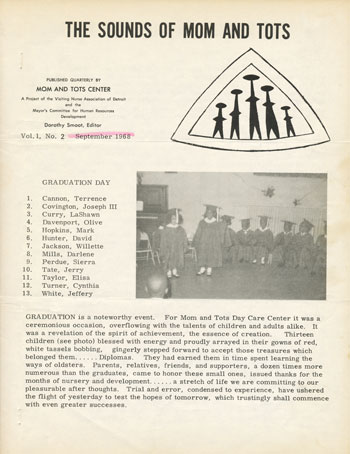Formation of a Matrix
Nancy speaks on forming a matrix of care. Full interview available on Audio page.

Formation of a Matrix
Pamela B. DeGuzman, PhD, MBA, RN
In the 1960s, Nancy Milio, a young, socially-conscious, public health nurse in Detroit Michigan, founded the Mom and Tots Center. “Mom and Tots-- as it came to be known by the neighborhood women who changed the name from the original (and significantly more formal) Maternity Satellite Clinic-- was an inner-city community center located at the corner of Kercheval and McClellan Streets in Detroit, Michigan. The center housed a prenatal and family planning clinic dedicated to providing accessible care to neighborhood women. The Center provided services that were essential to the women: geographically accessible prenatal care, family planning services and classes, and affordable childcare. Prior to opening the clinic, Milio had visited these women in their homes during her tenure as a public health nurse with the Visiting Nurses of Detroit. She had spoken with them at length about their vision for a neighborhood clinic and community center. Milio spent years developing the Center according to the neighborhood women’s specifications, and finding funding to support the neighborhood women who staffed the Center as daycare providers, administrators, and patient educators.
In July of 1967, riots erupted in Detroit, and Mom and Tots was right at the center of the destruction. Despite the millions of dollars of damage inflicted by rioters on Kercheval and other surrounding neighborhoods, the Center was left virtually untouched. In the days that ensued, it became clear that the Center was so valued by the community that it had been intentionally spared. As Milio stated in a 1994 interview, the Center had been marked by the neighborhood with the letter “B” on the window, which meant “that it shouldn’t be touched because it belonged to the people there”[i]
Fifty years after Nancy Milio founded Mom and Tots, we are still struggling to provide access to prenatal care and family planning for women in the U.S. and around the world. Half a century later, our awareness of this deficit has reached beyond the boundaries of the United States, to the global setting; yet the lessons of Dr. Milio’s legacy still apply. In 2000, world leaders launched an effort to reduce global poverty. The United Nation’s eight “Millennium Development Goals” (MDGs) were launched, with the aim of cutting global poverty in half by 2015. [ii] MDG #5, is to “improve maternal health,” and it includes an objective that echoes Milio’s own 1960s goal : to “achieve… universal access to reproductive health.” [iii]
At this point we are just two years shy of the time horizon for completion, but in many ways the goal of improving maternal health still remains elusive. Globally, nearly 50 million babies worldwide are delivered without skilled care each year, and the maternal mortality ratio is 15 times higher in undeveloped regions of the world than developed regions. Increases in contraceptive use have slowed since 2000, and family planning assistance remains low in many areas of the world.[iv]
Nearly 50 years after this inner-city community demonstrated their dedication to the Mom and Tots Center in the midst of civil unrest, we still have much to learn from Milio’s example. Nancy Milio’s vision for geographically and financially accessible family planning services may have been limited to helping the women of the Kercheval Street neighborhood, but the breadth of the impact that these services had on the lives of poor families is not limited to these women. It is now recognized that increasing access to family planning services has broad impact well beyond individual. According to Willard Cates, Jr. President of Family Health International, increasing access to family planning services is so vital to the war on global poverty that it is the lynchpin for achieving all of the MGDs.” [v]
In 1960s Detroit, Nancy Milio succeeded in what the United Nations has been struggling to achieve on a global scale, to improve access to family planning services and prenatal care for an at-risk group of poor women. The time and place are different, but the story is the same. Milio fought to provide these services for women in a way that was accessible and culturally sensitive. The replication of her story is being attempted on a global scale- and it is a story that is worth repeating.
[i] Nancy Milio Interview. CD-ROM. Directed by Denise Dooling. Located at The Nancy Milio Collection Box 1 at The Eleanor Crowder Bjoring Center for Nursing Historical Inquiry, University of Virginia. Charlottesville, VA: Michigan Leader in Community Health Nursing Oral History Project, 1994.
[ii]The Economist (US). 2013. "Towards the End of Poverty; the World's Next Great Leap Forward." June 1, 2013, 11.
[iii]United Nations. "Millennium Development Goals." Department of Public Information, last modified October 3, 2013, accessed October 3, 2013, http://www.un.org/millenniumgoals/.
[iv] ibid
[v]Cates, W.,Jr. 2010. "Family Planning: The Essential Link to Achieving all Eight Millennium Development Goals." Contraception 81 (6): 460-461. doi:10.1016/j.contraception.2010.01.002;10.1016/j.contraception.2010.01.002.